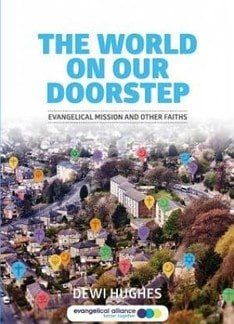This book is described as a resource aimed at helping UK churches engage with those of other faiths who live ‘on our doorstep’ rather than in distant lands.
Much is packed into 200 pages, with many examples of churches and missionary groups finding new ways of reaching adherents of other religions. The tone is descriptive rather than prescriptive, sometimes giving pros and cons of a particular approach.
The book is informative; the first chapter gives facts and figures drawn from the 2011 census, showing that there were then 4.4 million Muslims, Hindus, Sikhs, Jews and Buddhists in the UK. The figure today must be much higher.
In evangelism, engagement is the challenge. Many Christians living in big cities are side-by-side with those of other religions. Grasping the mindset of a Sikh, say, and participating in their cultural activities where possible is key.
Pastoral issues are discussed, such as the ‘insider movement’, where Christian converts keep their new faith secret and continue outwardly as members of their former religion. Whatever our reaction to this movement, it reveals the huge step it is for some converts (such as those from Islam) to openly profess Christianity.
Different views are given as to how much and how quickly converts should change in abandoning their ‘birth’ religion. The issue of converts maintaining or abandoning cultures accompanying their former religion is also discussed. To what extent we should adapt our church services to reflect other cultures is a question also raised.
A chapter on dialogue emphasises the importance of conversation, especially listening. At one end of the spectrum is the apologetic/polemical talking and listening approach. At the other end, ‘community understanding-building friendship’, where the aim is social cohesion rather than direct evangelism. St Philip’s, Leicester, embodies an example of this.
Another chapter gives an informative account of the history of education in the UK, with an overview of schools today, highlighting the vital role of the Christian teacher. ‘Evangelical churches support missionaries abroad … but often neglect to support the “missionary” teachers seeking to reflect the glory of Jesus in their local schools’ (p.143).
In higher education, an example is given showing how easy it is, by selecting module options, to gain a degree in religious and theological studies ‘with a very hazy conception of … Christianity or any other religion’ (p.154).
The book concludes with an excellent afterword by Dr David Landrum, director of advocacy at Evangelical Alliance. The two challenges of other religions in the UK are, firstly, reaching adherents with the life-saving message of salvation in the Lord Jesus Christ.
Secondly, it is to learn to live together with our deep differences. In many countries where other religions predominate, sharing the gospel often comes at a high risk of life and liberty. Here we can share our faith openly, at the present time; the opportunity must not be missed.
Richard Atherton
Whitby









